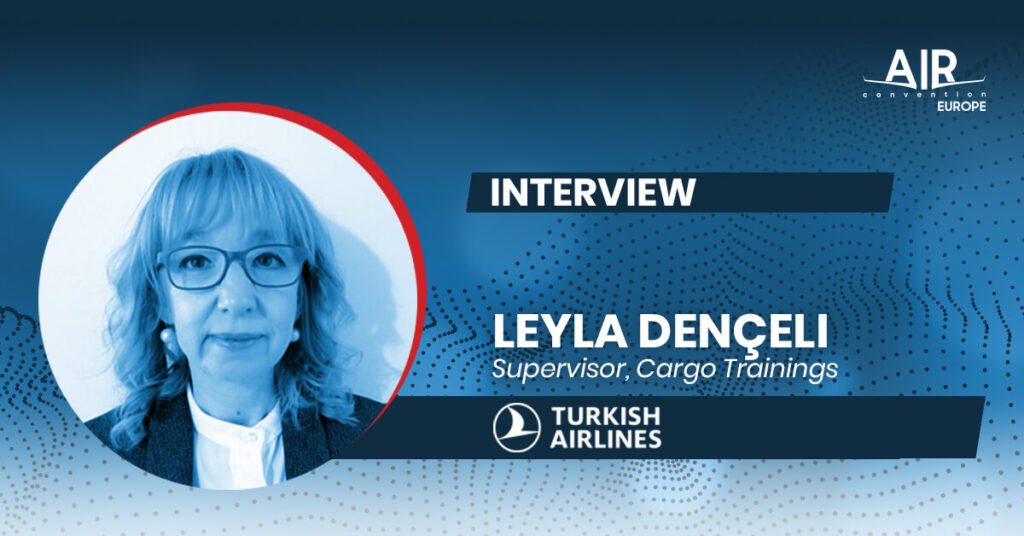What did the aviation cargo sector look like 20 years ago? How was the industry managed before email even existed? From the biggest changes that took place in the field to the most unusual goods transported by cargo, Supervisor of Cargo Training at Turkish Airlines Leyla Denceli is sharing the most exciting details about aviation cargo, very few know about.
What is the most curious aspect people don’t know about your area of expertise?
First of all, people still don’t know much about air cargo transportation. They think that only passengers and belongings are carried on airplanes. Most of them do not know that all kinds of goods are transported by air: from textile to food; from electronics to live rhinoceros or lions. Some of them do not know the processes of air cargo transportation such as customs, security warehouse storage and loading, documentation. As such, they cannot even estimate the scope of cargo training. Today, although the awareness of the cargo sector has increased, passenger transport still attracts more interest. People outside the sector are aware of pilot and, maybe, cabin crew training, but know little about cargo training or why is it needed.
What are the latest biggest achievements in the cargo training sector?
As the number of employees in the cargo industry has grown, training demand has also increased. While training has also been digitized, we were even more concerned with the effectiveness of training. This is why competency-based training will be mandatory in the near future. Safety first!
You have been working in the aviation cargo industry for more than 20 years. What were the biggest changes that took place in the field during that time?
One of the most significant changes is the communication. When I first started to work at İstanbul Atatürk airport in 1992 there was no such thing as email.
Everything was done on the phone. Offices were buzzing with the chit chat of operations and salespeople on the phones at their desks. Now when you walk into an office it is silent, as everyone is communicating on their computers. When I moved to training department in 1997 there wasn’t any computer and PPT for teaching. Everything was done manually.
The other big change that took place in the cargo industry is digital cargo and e-freight.
Previously, air waybills were assigned by airlines and sales staff would drop them off at the office or send them via courier. You would create a pouch that contained all of your shipping documents for air export consolidations. Sometimes the pouch would weigh kilograms. No scanner and email! Now, they are delivered electronically.
Great majority of data are now transferred by means of the paper documents in air cargo transportation. Considering that paper documents of approximately 30 pages are prepared for any international shipment, this method not only makes data communications harder, but also causes waste of paper in air cargo transportation processes.
What inspires you the most about working in cargo training sector?
While studying in the faculty of education, my biggest dream was to become a teacher. I went on to deliver trainings on passenger services and security. Now I love to give aviation lessons, especially on cargo and dangerous goods regulations as an instructor at Turkish Airlines Academy. In this way, I believe that I have touched many people working at Turkish Airlines and contributed to the provision of flight safety.
What did the aviation cargo sector look like 20 years ago? How was the industry was managed before email even existed? From the biggest changes that took place in the field to the most unusual goods transported by cargo, Leyla Denceli is sharing the most exciting details about aviation cargo, very few know about in this interview.
Catch Leyla Denceli’s talk at AIR Convention Europe on September 16-18th, in Vilnius, Lithuania. More about the event: https://www.airconvention.com
Leyla Dençeli is Cargo Trainings Instructor, Consultant, ICAO-IATA Course Developer and IATA-ICAO Instructor. Leyla has been working for Turkish Airlines since 1993, managing regular trainings in Air Cargo, designing the contents of trainings, reviewing and updating them in order to meet industry needs and changes in the IATA regulations. She is also a lecturer at IATA trainings and Supervisor for Cargo trainings at THY Aviation Academy.

